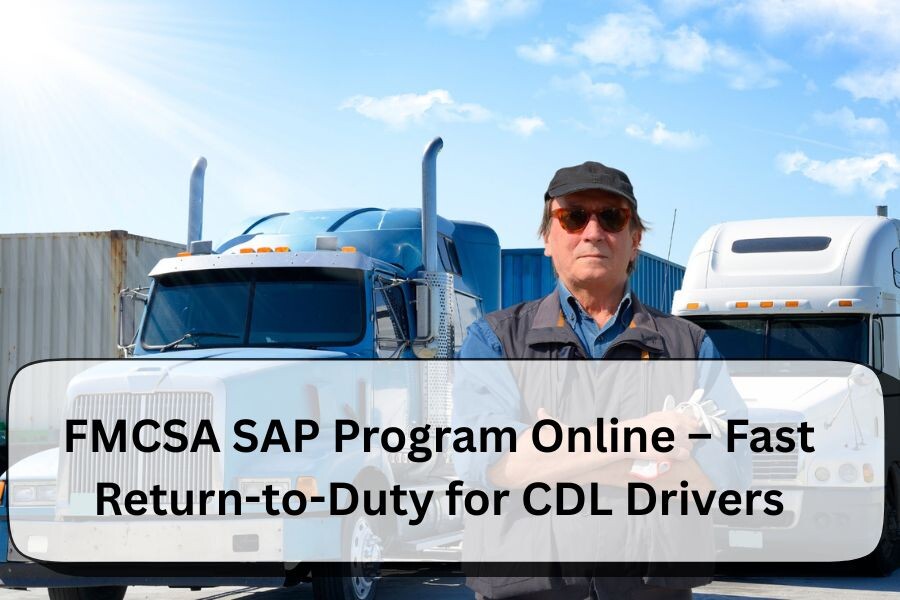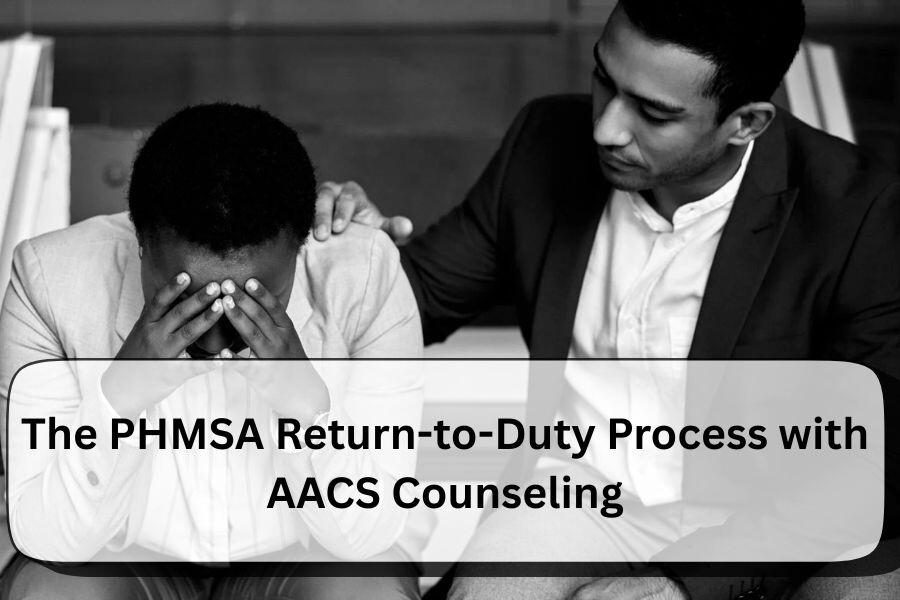Navigating the FAA SAP Program: Your Guide to Return to Duty
A violation of the Federal Aviation Administration’s (FAA) drug and alcohol policy can feel like a career-ending event. For pilots, flight attendants, mechanics, and other safety-sensitive employees, these regulations are among the strictest in any industry. However, a failed or refused test doesn’t have to mean the end of your aviation career. The FAA has a structured path forward: the Substance Abuse Professional (SAP) program.
This process is designed to ensure the safety of the flying public while providing a clear, regulated opportunity for employees to return to their duties. Understanding this journey is the first step toward getting back on track. This guide will walk you through what the FAA SAP program entails, what to expect, and how to successfully navigate the return-to-duty process.
Understanding the FAA Return to Duty Process
The FAA’s return-to-duty process is a formal procedure required for any safety-sensitive employee who has violated the Department of Transportation (DOT) drug and alcohol testing regulations. It is not merely a suggestion but a federal mandate outlined in 49 CFR Part 40. The primary goal is to ensure that an employee is safe to resume safety-sensitive functions.
This process is overseen by a qualified Substance Abuse Professional (SAP). The SAP’s role is to evaluate the employee, recommend a course of education or treatment, and determine their eligibility to take a return-to-duty test. Completing this process is the only way an employee can legally be cleared to return to a safety-sensitive role.
When an FAA Employee Needs a SAP Program
An FAA employee must enter the SAP program if they violate any DOT drug and alcohol rules. This is not limited to just testing positive. The requirement is triggered by several situations, including:
- A positive drug test result: Testing positive for any of the substances in the DOT-mandated drug panel.
- An alcohol test result of 0.04 or greater: This concentration level is considered a violation.
- Refusal to test: This includes failing to appear for a test, failing to provide a specimen on time, or tampering with a sample.
- On-duty alcohol or drug use: Using alcohol or illicit drugs while performing safety-sensitive duties.
If any of these events occur, the employee is immediately removed from all safety-sensitive duties and must begin the SAP process before they can be considered for reinstatement.
SAP Program for FAA Safety-Sensitive Employees
The SAP program is a comprehensive system designed to address substance use issues and ensure long-term compliance. It’s tailored to the individual, based on a professional clinical assessment. The program ensures that the employee receives the appropriate level of care, whether it’s education, counseling, or more intensive treatment.
The SAP is responsible for managing the entire process. These professionals are not advocates for the employee or the employer; their function is to protect public safety. They must be DOT-qualified, which requires specific training, credentials, and ongoing education about federal regulations.
What to Expect from the Return to Duty Process
The return-to-duty process follows a series of specific, non-negotiable steps. Each one must be completed successfully before moving to the next.
- Initial SAP Evaluation: Your first step is a face-to-face, comprehensive assessment with a DOT-qualified SAP. During this meeting, the SAP will review the details of your violation and conduct a clinical evaluation to understand the nature and extent of any substance use issues.
- Education or Treatment Plan: Based on the evaluation, the SAP will create a personalized plan. This can range from educational courses about substance use to a recommendation for outpatient counseling or an inpatient treatment program. You must complete this plan as prescribed.
- Follow-Up SAP Evaluation: After you provide proof of completing your treatment plan, you will have a second face-to-face evaluation with the same SAP. The purpose of this meeting is for the SAP to determine if you have successfully complied with the recommendations and have demonstrated a commitment to living safely.
- Return-to-Duty Test Authorization: If the SAP is satisfied with your progress, they will issue a formal report to your employer clearing you to take a return-to-duty test.
- Testing and Reinstatement: You must take a drug and/or alcohol test under direct observation and receive a negative result. Once your employer receives the negative test result, they can choose to return you to safety-sensitive duties.
- Follow-Up Testing Plan: The SAP will also provide your employer with a schedule of unannounced, follow-up tests. You will be subject to a minimum of 6 tests in the first 12 months, and the testing plan can extend for up to 5 years. This follow-up testing follows you even if you change employers.

How Does an FAA Employee Connect with the Right SAP?
Finding a DOT-qualified SAP is the employee’s responsibility, and it’s a critical step. An employer is required to provide you with a list of available SAPs, but there is no guarantee that everyone on the list is currently qualified or accepting new clients. Working with a professional who is not DOT-qualified will invalidate the entire process, forcing you to start over and costing you valuable time and money.
To avoid this risk, many employees turn to trusted referral services. These organizations maintain networks of vetted, DOT-qualified SAPs nationwide, ensuring you connect with a professional who meets all federal requirements. This simplifies the search and provides peace of mind that you are starting the process correctly.
Why Choose AACS Counseling?
Navigating the FAA’s return-to-duty process can be stressful and confusing. At AACS Counseling, we specialize in guiding aviation professionals through every step with clarity and compassion. We understand the high stakes involved in your career and are committed to helping you return to the skies safely.
Our network consists of fully vetted, DOT-qualified Substance Abuse Professionals who have extensive experience with FAA regulations. We simplify the process by providing fast and reliable connections to a qualified SAP in your area, ensuring you start your journey on the right foot. With AACS Counseling, you receive expert guidance, confidential support, and a clear path forward.
FAQs
Does a failed FAA drug test go on your record?
Yes. A failed drug test or testing violation is recorded and reported. For pilots, mechanics, and other certified airmen, it is also reported to the FAA’s Drug Abatement Division. The violation becomes part of your permanent DOT record and must be disclosed to any future DOT-regulated employers.
What are the FAA alcohol regulations?
FAA regulations prohibit safety-sensitive employees from reporting for duty or remaining on duty with a blood alcohol concentration of 0.04 or greater. They are also prohibited from using alcohol while on duty or within eight hours of performing flight crew member duties (or four hours for other safety-sensitive employees).
Do FAA drug and alcohol regulations apply to flight attendants?
Yes. Flight attendants are considered safety-sensitive employees under FAA regulations. They are subject to the same drug and alcohol testing rules as pilots, mechanics, and dispatchers. This includes pre-employment, random, post-accident, reasonable suspicion, return-to-duty, and follow-up testing.
Are there FAA-approved medications for flight attendants?
The FAA does not have a list of “approved” medications. Instead, it provides guidance on which medications may be disqualifying. Any drug, prescription or over-the-counter, that could impair your cognitive or physical abilities is generally prohibited. You must disclose all medication use to your Aviation Medical Examiner (AME) and consult with them before performing safety-sensitive duties.
What steps must I take to return to the performance of safety-sensitive functions after I violated the FAA’s drug and alcohol testing regulation?
You must complete the DOT return-to-duty process with a qualified SAP. This involves an initial evaluation, completion of a recommended treatment or education program, a follow-up evaluation, and passing a return-to-duty test. Afterward, you will be subject to a series of unannounced follow-up tests.
If you’re facing an FAA drug or alcohol violation, you don’t have to navigate the path alone. Contact AACS Counseling today to connect with an expert SAP and take the first step toward restoring your career.
The Mini Handheld Air Blower, when compared to a compact car vacuum, is designed to blow dust away instead of sucking it in. While vacuums are more effective for removing crumbs and dirt, the blower is particularly adept at cleaning tight spaces, such as vents and switches, where vacuums often have difficulty. For fine dust and detailed cleaning, the blower is the quicker and more convenient choice.











![DOT SAP Program in Alabama: A Complete Guide [2025]](https://www.aacscounseling.com/wp-content/uploads/2025/11/Comprehensive-Insight-Alcohol-and-Drug-Evaluation-Questions-and-Duration-Explained-3.jpg)
![DOT SAP Program in Colorado: A Complete Guide [2025]](https://www.aacscounseling.com/wp-content/uploads/2025/11/Comprehensive-Insight-Alcohol-and-Drug-Evaluation-Questions-and-Duration-Explained-4.jpg)
![DOT SAP Program in Arizona: A Complete Guide [2025]](https://www.aacscounseling.com/wp-content/uploads/2025/11/Comprehensive-Insight-Alcohol-and-Drug-Evaluation-Questions-and-Duration-Explained-5.jpg)